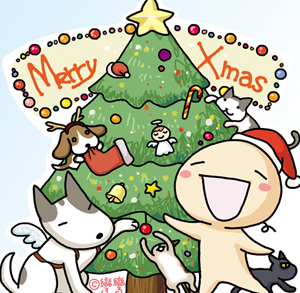Saturday, December 23, 2006
再錯也要談戀愛
我們這些戀愛的人
人生一點也不麻煩。
麻煩的是愛情。
暗戀、追求、寫信、等人、約會、上床、避孕、鋪床、相思、留戀、變心、分手……
沒有一樣不是麻煩的要命。
可是我們還是要戀愛。
我們嘴上說我們要的是幸福、快樂、平靜、溫柔、夢想實現、觸碰永生……
實際上呢,我們還是要戀愛。
“不愛,是不行的……”
我們沒有說出口,可是對這句話,我們信得不能更信、堅持得不能更堅持。
對我們這些戀愛的人來說,愛情的反反覆覆、陰晴不定、難以抉擇、匪夷所思……
所有這些愛情的先天病毒,我們都視死如歸的去招惹、去感染、去纏鬥。
因為戀愛是非要不可的,一切的麻煩、就都算不得是麻煩了。
要是完全得不到戀愛的機會,那才真的麻煩大了,活著簡直不知道要幹甚麼。
所以結論就很清楚了——
愛情一點也不麻煩。
麻煩的是人生。
——蔡康永
Tuesday, December 19, 2006
我们来探讨下人生吧!
以下为ZT,引用来,作为探讨人生的开场白。
出生了,会笑了,断奶了,会跑了,上学了,会玩了,懂事了,初中了,恋爱了,失败了,有希望了,上高中了,想学习了,又失败了,逐渐绝望了,却上大学了,一切都好了,没有人管了,抽烟了,喝酒了,打架了,处分了,老实了,学不进去了,只好恋爱了,甜蜜了,同居了,第一次也没了,吵架了,又和好了,又吵架了,就分手了,转眼毕业了,立马傻眼了,好歹工作了,挣钱了,花完了,看破红尘了,十年过去了,三十好几了,也该结婚了,说办就办了,孩子早有了,安定了,团结了,觉得幸福了,孩子长大了,我们也老了,孩子结婚了,不管老的了,生气了,生病了,突然觉悟了,不过也死了!谨献给懂得享受生活的每个人,珍惜每一天!
Monday, December 18, 2006
OVERTIME~
1、美特斯邦威:不加寻常班
2、特步: 加班,死一般的感觉
3、百事:加班无极限
4、森马:上什么公司,加什么班
5、脑白金:今年过节不加班,加班只加节假日
6、汇仁肾宝:他加我也加
7、李宁:加班,一切皆有可能
8、旺旺:你加,我加,大家加,加加
9、农夫山泉:加了有点烦
10、好迪:大家加,才是真的加
11、白加黑:白天加白班,不瞌睡;晚上加晚班,睡不着
12、联想:公司不加班,公司会怎么样
13、娃哈哈:妈妈~~我也要加班!
14、清嘴:你知道加班的味道吗?
15、安踏:我加班,我喜欢!
16、NIKE:Just 加 it!
17、钙中钙:现在的加班啊,它含金量高,加一天顶过去五天,实惠!你瞧我,一口气加了5天,不费劲!
18、富安娜——那有一夜不加班
Sunday, December 17, 2006
對聯
与有肝胆人共事,从无字句处读书。
世间唯有读书好,天下无如吃饭难。
万紫千红皆不外明灯一盏,高云皓月也都在破衲半山。
虽谓微未技艺,却是顶上功夫
树已半寻休纵斧,果然一点不相干
西岭烟霞生袖底,东湖云海落樽前 (颐和园谐趣园中的涵远堂门上的)
海水朝朝朝朝朝朝朝落,浮云长长长长长长长消
树已半寻休纵斧,果然一点不相干 (属于无情对,据说是张之洞对的)
有鹤松皆古,无花地亦香
山高益壮志,石古藏灵根
水月寺鱼游兔走,山海关虎跃龙腾
水中鱼,月中兔
山中虎,海中龙
大肚能容容天下难容之事,笑口常开笑天下可笑之人
世事洞明皆学问,人情练达即文章
海纳百川有容乃大,山高千刃无欲则刚
五月黄梅天
三星白兰地
公门桃里争荣日
法国荷兰比利时
动武
挪威
青稞
丹麦
唐三彩
青一色
(这类字字工整但意思风马牛不相及的对子叫无情对)
天若有情天亦老,月如无恨月常圆(唐宋对)
一孤舟,二客商,三四五六水手,扯起七八叶风帆,下九江,还有十里;
十里运,九里香,八七六五号轮,虽走四三年旧道,只二日,胜似一年。
傲骨梅无仰面花,虚心竹有低头叶
愿乘风破万里浪,甘面壁读十年书
一水护田将绿绕,两山排闼送青来
元后亶聪明,二百载继继承承,顺天心,康民物,雍和其德,乾健其身,嘉惠普群生,道统昭羲农尧舜
继皇臻福寿,亿万年绵绵翼翼,治功懋,熙绩勋,正直在朝,隆平在野,庆云辉五色,光华联日月星辰
鸟在笼中望孔名想张飞无奈关羽
鱼游浅水思明水知肇源难进龙镇
四水江第一,四时夏第二,老夫居江夏,谁是第一,谁是第二(张之洞)
三教儒在前,三才人在后,小子本儒人,何敢在前,何敢在后(梁启超)
(谐趣联)
童子打桐子,桐子落,童子乐
和尚立河上,河上崩,和尚奔
(谐趣联)
嫂扫乱柴呼叔束
姨移破桶唤姑箍
(谐音讽刺联)
民国万税
天下太贫
移椅倚桐同望月
掌灯登阁各攻书
今日之东,明日之西,光阴苒苒,岁月悠悠。留不住珠影绿鬓,带不去白璧黄金。富若石崇,贵若杨素,绿珠红拂皆成空。忙什么?请君且住片时,把寸心,思前想后。得安闲处且安闲,留些奔波过来日。
这条路来,那条路往,青山叠叠,绿水茫茫。走不尽楚峡秦关,填不满心潭欲海。力兮项羽,智兮曹操,乌江赤壁空烦恼。悭怎的?待我放下文钱,沽瓶酒,猜三度两。能畅饮时须畅饮,西出阳关无故人。
成都望江楼长联:
几层楼独撑东面峰,统近水遥山、供张画谱。聚葱岭雪,散白河烟,烘丹景霞,染青衣雾。时而诗人吊古,时而猛士筹边。最可怜花蕊飘零,早埋了春闺宝镜。枇杷寂寞,空留着绿野香坟。对此茫茫,百感交集。笑憨蝴蝶,总贪迷醉梦乡中。试从绝顶高呼,问问问,这半江月,谁家之物?
千年事屡换西川局,尽鸿篇巨制,装演英雄。跃岗上龙,殒坡前凤,卧关下虎,鸣井底蛙。忽然铁马金戈,忽然银笙玉笛。倒不若长歌短赋,抛撒些闲恨闲愁。曲槛回廊,消受得好风好雨。嗟予蹙蹙,四海无归。跳死猢狲,终落在乾坤套里。且向危梯俯首:看看看,那一块云,是我的天!
大观楼长联:
五百里滇池奔来眼底,披襟岸帻,喜芒芒空阔无边。看:东骧神骏,西翥灵仪,北走蜿蜒,南翔缟素。高人韵士何妨选胜登临。趁蟹屿螺洲,梳裹就风鬟雾鬓;更苯天苇地,点缀些翠羽丹霞,莫孤负:四围香稻,万顷晴沙,九夏芙蓉,三春杨柳。
数千年往事注到心头,把酒凌虚,叹滚滚英雄谁在?想:汉习楼船,唐标铁柱,宋挥玉斧,元跨革囊。伟烈丰功费尽移山心力。尽珠帘画栋,卷不及暮雨朝云;便断碣残碑,都付与苍烟落照。只赢得:几杵疏钟,半江渔火,两行秋雁,一枕清霜。
Person of the Year: You

Yes, you. You control the Information Age. Welcome to your world.
By LEV GROSSMAN
The "Great Man" theory of history is usually attributed to the Scottish philosopher Thomas Carlyle, who wrote that "the history of the world is but the biography of great men." He believed that it is the few, the powerful and the famous who shape our collective destiny as a species. That theory took a serious beating this year.
To be sure, there are individuals we could blame for the many painful and disturbing things that happened in 2006. The conflict in Iraq only got bloodier and more entrenched. A vicious skirmish erupted between Israel and Lebanon. A war dragged on in Sudan. A tin-pot dictator in North Korea got the Bomb, and the President of Iran wants to go nuclear too. Meanwhile nobody fixed global warming, and Sony didn't make enough PlayStation3s.
But look at 2006 through a different lens and you'll see another story, one that isn't about conflict or great men. It's a story about community and collaboration on a scale never seen before. It's about the cosmic compendium of knowledge Wikipedia and the million-channel people's network YouTube and the online metropolis MySpace. It's about the many wresting power from the few and helping one another for nothing and how that will not only change the world, but also change the way the world changes.
The tool that makes this possible is the World Wide Web. Not the Web that Tim Berners-Lee hacked together (15 years ago, according to Wikipedia) as a way for scientists to share research. It's not even the overhyped dotcom Web of the late 1990s. The new Web is a very different thing. It's a tool for bringing together the small contributions of millions of people and making them matter. Silicon Valley consultants call it Web 2.0, as if it were a new version of some old software. But it's really a revolution.
And we are so ready for it. We're ready to balance our diet of predigested news with raw feeds from Baghdad and Boston and Beijing. You can learn more about how Americans live just by looking at the backgrounds of YouTube videos—those rumpled bedrooms and toy-strewn basement rec rooms—than you could from 1,000 hours of network television.
And we didn't just watch, we also worked. Like crazy. We made Facebook profiles and Second Life avatars and reviewed books at Amazon and recorded podcasts. We blogged about our candidates losing and wrote songs about getting dumped. We camcordered bombing runs and built open-source software.
America loves its solitary geniuses—its Einsteins, its Edisons, its Jobses—but those lonely dreamers may have to learn to play with others. Car companies are running open design contests. Reuters is carrying blog postings alongside its regular news feed. Microsoft is working overtime to fend off user-created Linux. We're looking at an explosion of productivity and innovation, and it's just getting started, as millions of minds that would otherwise have drowned in obscurity get backhauled into the global intellectual economy.
Who are these people? Seriously, who actually sits down after a long day at work and says, I'm not going to watch Lost tonight. I'm going to turn on my computer and make a movie starring my pet iguana? I'm going to mash up 50 Cent's vocals with Queen's instrumentals? I'm going to blog about my state of mind or the state of the nation or the steak-frites at the new bistro down the street? Who has that time and that energy and that passion?
The answer is, you do. And for seizing the reins of the global media, for founding and framing the new digital democracy, for working for nothing and beating the pros at their own game, TIME's Person of the Year for 2006 is you.
Sure, it's a mistake to romanticize all this any more than is strictly necessary. Web 2.0 harnesses the stupidity of crowds as well as its wisdom. Some of the comments on YouTube make you weep for the future of humanity just for the spelling alone, never mind the obscenity and the naked hatred.
But that's what makes all this interesting. Web 2.0 is a massive social experiment, and like any experiment worth trying, it could fail. There's no road map for how an organism that's not a bacterium lives and works together on this planet in numbers in excess of 6 billion. But 2006 gave us some ideas. This is an opportunity to build a new kind of international understanding, not politician to politician, great man to great man, but citizen to citizen, person to person. It's a chance for people to look at a computer screen and really, genuinely wonder who's out there looking back at them. Go on. Tell us you're not just a little bit curious.
From the Dec. 25, 2006 issue of TIME magazine


